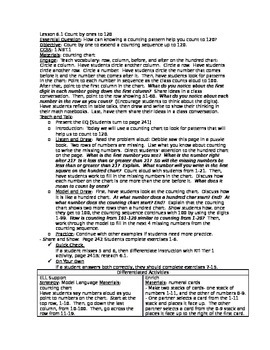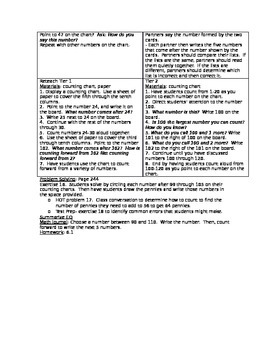First Grade- Go Math!- Chapter 6- Lesson Plans
Highly Effective Teaching with MrsLefko
161 Followers
Grade Levels
1st
Subjects
Resource Type
Standards
CCSS1.NBT.A.1
CCSS1.NBT.B.2
CCSS1.NBT.B.2a
CCSS1.NBT.B.2b
CCSS1.NBT.B.2c
Formats Included
- Word Document File
Pages
22 pages
Highly Effective Teaching with MrsLefko
161 Followers
Description
UPDATED for the 2015 version of Go Math!
As a Common Core Fellow for the NYCDOE, and as a facilitator for a Go Math! Implementation course for lead teachers, I have a thorough understanding of the Common Core State Standards, Standards for Mathematical Practice, and the key shifts. My lesson plans are intricately planned with all of these essential components in mind. I look at the Go Math! recommendations and make strategic adjustments to ensure that all are given appropriate weight, while also adding scaffolds. They have the appropriate level of scaffolds and rigor for students in any school, and any classroom setting, as they are intended for my class that contains about 40% students with special needs, 60% general education students, and multiple English Language Learners. The lessons plans will download in Word so they can be edited to your liking. Search my store for the corresponding Smart Board lessons.
Danielson Framework Alignment:
1a: Demonstrating Knowledge of Content and Pedagogy
1e: Designing Coherent Instruction
This document contains detailed plans for the 10 lessons for this chapter, along with a plan for Show What You Know, the chapter test, and performance task.
As a Common Core Fellow for the NYCDOE, and as a facilitator for a Go Math! Implementation course for lead teachers, I have a thorough understanding of the Common Core State Standards, Standards for Mathematical Practice, and the key shifts. My lesson plans are intricately planned with all of these essential components in mind. I look at the Go Math! recommendations and make strategic adjustments to ensure that all are given appropriate weight, while also adding scaffolds. They have the appropriate level of scaffolds and rigor for students in any school, and any classroom setting, as they are intended for my class that contains about 40% students with special needs, 60% general education students, and multiple English Language Learners. The lessons plans will download in Word so they can be edited to your liking. Search my store for the corresponding Smart Board lessons.
Danielson Framework Alignment:
1a: Demonstrating Knowledge of Content and Pedagogy
1e: Designing Coherent Instruction
This document contains detailed plans for the 10 lessons for this chapter, along with a plan for Show What You Know, the chapter test, and performance task.
Total Pages
22 pages
Answer Key
Does not apply
Teaching Duration
3 Weeks
Report this resource to TPT
Reported resources will be reviewed by our team. Report this resource to let us know if this resource violates TPT’s content guidelines.
Standards
to see state-specific standards (only available in the US).
CCSS1.NBT.A.1
Count to 120, starting at any number less than 120. In this range, read and write numerals and represent a number of objects with a written numeral.
CCSS1.NBT.B.2
Understand that the two digits of a two-digit number represent amounts of tens and ones. Understand the following as special cases:
CCSS1.NBT.B.2a
10 can be thought of as a bundle of ten ones - called a “ten.”
CCSS1.NBT.B.2b
The numbers from 11 to 19 are composed of a ten and one, two, three, four, five, six, seven, eight, or nine ones.
CCSS1.NBT.B.2c
The numbers 10, 20, 30, 40, 50, 60, 70, 80, 90 refer to one, two, three, four, five, six, seven, eight, or nine tens (and 0 ones).



